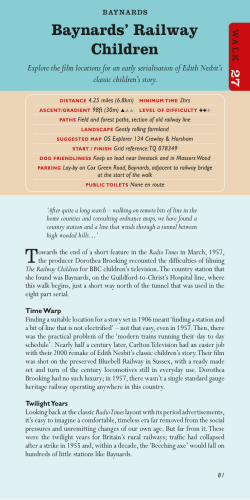
Document 69480
< streetwalk >
The Railway Children Walk the line
OURTEEN
YEARSAGO,Javed arrived in Delhi, alone and
penniless. Now 21, the erstwhile street kid leads us
into the underbelly of New Delhi Railway Station, on a
walk organised daily by the Salaam Baalak Trust. Over
two hours we are guided into a Dickensian world we never
knew existed: a secret attic above a railway bookstall, a
Contact Point where 'new kids' are brought every morning,
and a teacher called 'Mummy'.
Starting from the station entrance, we walk to the 'Luxury
F
Platform', Kids sneak here to feast on goodies like chicken and
cutlets, prized leftovers from the Shatabdi trains. Javed points
to a coveted sleeping space on the roof of Platform No. 5"safe, since fat cops can't get through the grills". Looking
down at the 'bathroom', where water was gushing out of a railway pipeline, Javed muses about the weekends: films at Sheila
theatre, and getting high on Tipp-Ex. "Our life is like stagnant
water and sometimes we want to feel free oi pain," he
explains. The railway children can earn around Rs 60 a day
,",,"w,,
''''"'
Javed leads visitors on
the Salaam Baalak walk
working as sweepers and rag-pickers. Some of
that goes towards protection money--<oollected by a juice-walla. "You can't survive in the
station without connections," Javed says.
Next we saunter down an alley in Pottery
Market, popular for its "cheap non-veg food."
At the end of a neighbouring cul-de-sac, lined
with crumbling havelis, was a shelter home
for young children. Our interruption was welcomed in the busy classroom.
Finally, in another shelter at Paharganj,
where Hrithik Roshan disbursed dreams from
a wall, teenagers buzzed around in groups.
Being trained to become "responsible members of society", they would leave the shelter
on turning 18. This 6nal destination of their
street life also marked the end of our tour and
we walked out-humbled. -
{Mayank Austoo Sooll}
Ch"9' Walk,,,acowelcom,10dunat,what
thay
"'" butRn200is
goodCon"o' Ju.ed108109752841:
see_."'"mb"lakt,,,'wm
© Copyright 2025





















